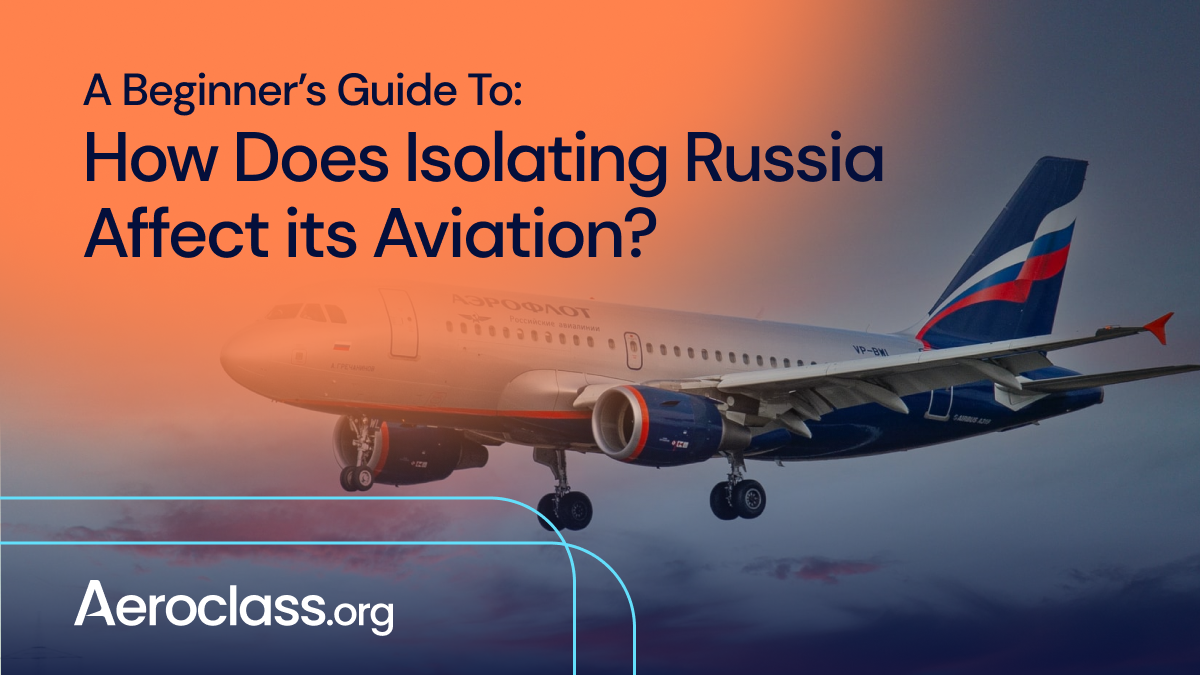Western sanctions on Russia due to what they called “special operations” in Ukraine, but that many deemed as an invasion, are escalating Russian airline isolation as jetmakers halt parts supply.
This is yet another hit to Russian aviation after EU sanctions forced leasing firms to terminate their contracts with Russian airlines before March 28th. All these sanctions go together with Russian aircraft being banned from the airspace of the European Union, Canada, and the United States of America.
While the sanctions are imposed on Russia, many experts in the aviation industry are predicting the impact will be more extensive, and they believe there will be some collateral damage.
Action taken by Boeing and Airbus
The two biggest plane makers, Boeing and Airbus, have already taken action according to Western sanctions as they have halted the supply of components and their support to Russian airlines.
On one side, Boeing stated that the organization had “suspended major operations” in Russia, including operations in research and engineering centers located in that country.
On the other side, Airbus mentioned that it is halting parts supply and their service. They also have an engineering center in Moscow, but they are still analyzing whether the center could keep operations to provide local customers.
Current situation of Russian aviation
English aviation data, intelligence, and advisory company called IBA reports that Russia accounted for about 6% of airline capacity in 2021, up from 4% in 2019, thanks to its strong relative performance during the pandemic.
Also, based on Cirium Fleets data, Russian airlines have a total of 332 Boeing and 304 Airbus jets representing two-thirds of the whole Russian fleet.
However, according to Cirium 515 out 777 leased aircraft in Russia come from foreign leasing firms that will be cutting their contracts and looking forward to repossessing their airplanes soon.
Adding the fact that they will have limited access to spare parts, which are necessary to keep airplanes operating properly, it is clear that Russian aviation is feeling the impact of Western sanctions.
Rob Stallard, an analyst for Vertical Research Partners believes “the Russian aviation sector is now on a footing that is similar to North Korea and Iran – and similar to where it was under Soviet rule”.
Possible actions from Russian aviation
As the Russian government mentioned in a recent statement, there will be retaliation. However, that will not solve the problem for the aviation sector.
Airliners require constant supervision that ranges from daily inspections to heavy maintenance every six years.
In the short term, Russian airlines might not require parts to solve routine issues that may be cared for internally and after a certain number of days. However, there may be cases where some components may need an immediate replacement for the airplane to be cleared for operation.
While planes owned by Russian airlines can be flown domestically as long as they have the necessary parts in stock, air carriers may still have difficulties getting maintenance on their airplanes in the limited areas of the world where they can still fly, according to some maintenance experts.
Moreover, even if Russian airlines find parts outside the country, they still have to deal with possible payment struggles since some Russian banks have been left out of the SWIFT international payments system.
So, Russian aviation will need to take action to find alternate solutions to avoid seeing their entire fleet grounded. And these could come in different forms.
Cannibalizing aircraft in Russia
Cannibalizing aircraft is the practice of stripping apart aircraft that may not be needed in operation to use the parts on operational aircraft. This could be an alternative for Russian aviation to solve the current situation.
According to the head of Russian analytical agency AviaPort, Oleg Panteleev, “cannibalization will be possible because the need for the planes will fall”.
However, Panteleev also made clear about Russian aviation that “It will have to create a full-fledged maintenance system for some types of aircraft”.
The latter comes from the fact that some organizations offering Russian airlines maintenance services are also cutting their contracts. For example, Lufthansa Technik already stated that it will cease servicing Russian customers, leaving hundreds of airplanes without maintenance.
Another aspect of cannibalization is that it could directly affect leasing firms, especially foreign ones. Considering that 777 airplanes are leased and 515 belong to foreign firms cutting their contracts, these could definitely be the first victims of cannibalization since repossessing may take too long as it requires Russian airlines and courts to comply, something that is unknown.
It seems that cannibalization has not started yet, but this could become a reality any time.
Supply alternatives for Russian airlines
A more reasonable action and one many experts expect Russian airlines to take is looking for alternative providers.
It is known that some rather old airplanes in markets other than the West use parts made in China which could be an interesting provider for Russia. Also, they could follow the so-called under-the-table supplies system that Iran has been using for decades.
As stated by mister Panteleev, “Of course, it would be good for Russia to find suppliers and partners in third countries who would be ready to ensure stable shipments of all necessary components, but if these countries say they are afraid of sanctions, Russia would need to search for foreign specialists and create a maintenance system at Russian factories.”
The only drawback for Russian airlines, and one they should take seriously, is that using parts that are not official could result in aircraft becoming difficult to finance once the war is over.
Global scale impact
Although Western sanctions are imposed on Russia, and Russian aviation is the most affected player in the global aviation industry, many experts believe the impact will extend beyond.
An example of this is that some international airlines require maintenance and parts replacement at their destinations, and some of them still fly to Russia. This includes Flydubai an international carrier that stated they are currently monitoring the situation since they operate a fleet of 737s to eight Russian cities.
Also, recalling what was mentioned above, leasing firms could see their aircraft cannibalized. As Peter Walter, director of technical and asset management at IBA said, “because parts are limited, we will expect to see aircraft that are on the ground in Russia being robbed in order to keep the remainder of the fleet operational.”
Meanwhile, Russia is trying to assemble its own Superjet with Russian engines at Sukhoi’s factory to have it operational by 2024. Perhaps a proud retaliation after being told they will not be receiving new Boeing or Airbus aircraft although they have 62 airplanes in order.
Only time will tell the truth, but we hope war can stop soon as well as all its collateral damage.






